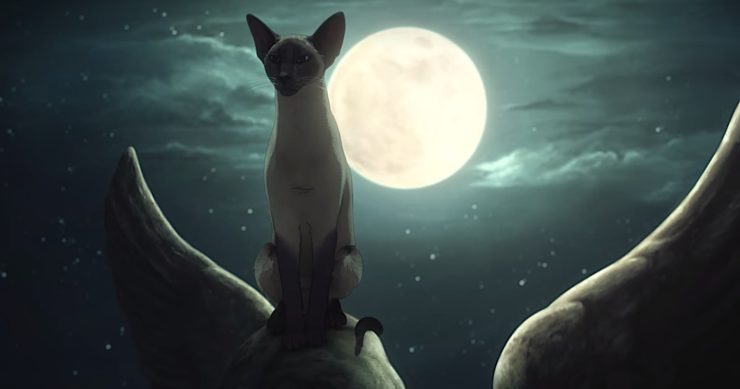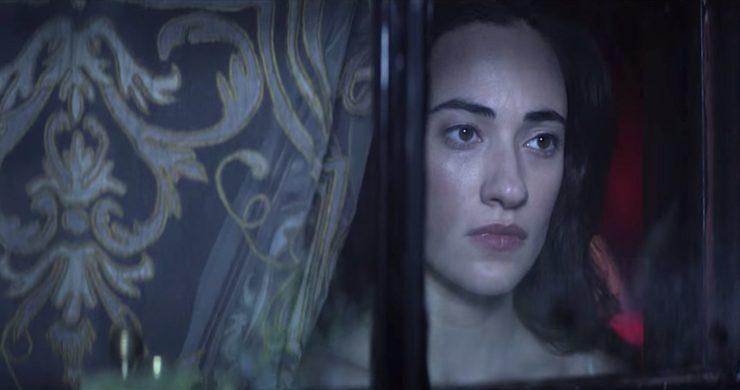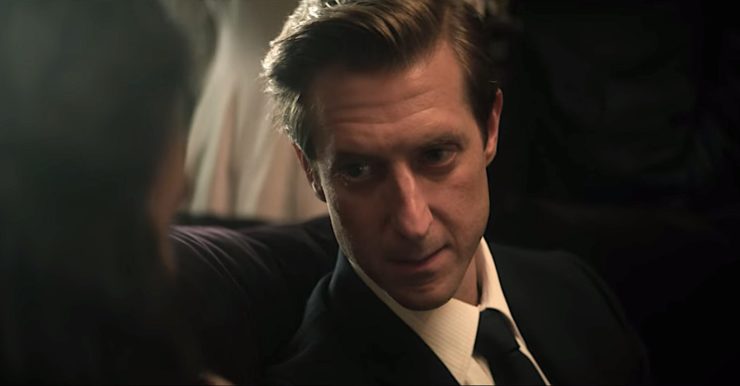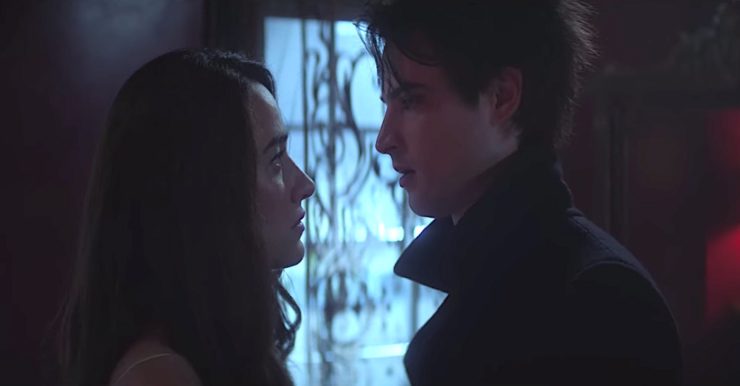We got a surprise episode of The Sandman! The adaptation of “A Dream of A Thousand Cats” and “Calliope” premiered on Netflix on Friday, and, like the rest of the series, was a strong adaptation of the comic that sometimes even improved on its source.
As my discussion of the episode deals with the choices made in adaptation, it is necessarily spoiler-y! So if you haven’t watched the episode yet, and plan to, please come back to this one at a later date.
“Dream of A Thousand Cats” is predictably great. The animation is lovely, with a wide variety of cats included, and a slightly Spooky Season tone with all the cats meeting up in a graveyard under the light of a full moon.

The voice cast features a few actors from the audio adaptation of The Sandman, with Good Omens’ stars David Tennant and Michael Sheen joined by their real-life partners, Georgia Tennant and Anna Lundberg, the main kitten played by Rosie Day, her older tomcat buddy played by David Gyasi, the prophetess cat played by Sandra Oh, and a skeletal raven played by Neil Gaiman. Tom Sturridge has just as much gravitas as Cat!Morpheus as he does as ModernGothBoi!Morpheus.
“Calliope” is… difficult. It’s a difficult, dark, upsetting story to begin with. I think the adaptation works better than I expected it would actually. Where in the comic Richard Madoc is just a shit from the beginning, here he’s given enough personality and narrative arc to make his choices all the more disgusting. He uses his work to lull women into a false sense of security, but he accepts Erasmus Fry’s instructions without a second thought, and is completely okay with objectifying Calliope and raping her for inspiration.
The adaptation makes things worse!
Again, some of it’s down to casting. Arthur Darvill is excellent, and his past work in Doctor Who, Broadchurch, and Legends of Tomorrow make him sympathetic on sight. When he picks Calliope up from Fry, he recoils at the man’s harshness, and seems horrified by her situation. You could be forgiven for thinking that he might immediately free her. Derek Jacobi, who plays Erasmus Fry, is Derek fucking Jacobi. And Melissanthi Mahut is excellent in a difficult role as Calliope—furious and despairing, but never a victim. And yes, I know, every article about this turns into the Tom Sturridge Appreciation Hour, but still. Every conversation with Calliope is freighted with their history, and you can feel him choosing each word. He loves her, he wants her to be in his life, he grieves for their son, he regrets everything. And of course the brief, loaded confrontation with Madoc is chilling.

And, as I said, you might be forgiven for thinking the story’s going to take a better path. Even after Madoc brings her back to his house, unlike the bare room and old cot the comics version, Madoc installs her in a nice room with a fireplace, warm lights, real furniture. He asks for her help, he brings her chocolates, perfume, and flowers to “woo” her. She pays him the compliment of trying to reason with him. Could it be that he’ll see that she’s a real being, not an object to be used?
But no, he ignores everything she says, and any hope that he’s going to be an improvement on Fry slowly dies. She repeatedly asks him to free her, and makes it clear that she won’t even discuss giving him inspiration willingly until he does so. And the show drags this out a bit, making it seem that he might come to his senses and let her go. But no, he’s presented with a blank screen and a blinking cursor, followed by the threat of having to pay his novel advance back—a choice between being a decent person and not—and a scene later he’s heading up the stairs to her room.
They don’t show what happens (another improvement on the comic), but it’s obvious, and it makes Madoc so much worse than Fry, and, honestly, worse than the awful character on the page. The Madoc of the comics was simply a monster—this one is a man who chooses to do evil.
The episode focuses on the idea of choice far more than the comic. Where Fry seems like a despicable person, Madoc could have chosen a different path for himself, and the show gives an entire scene to him mulling his choices. Calliope never blames herself for her imprisonment, as she does in the comic, and once Morpheus comes to her he asks her how she wants him to intervene, never presuming to know her mind. (He certainly never calls her “child” as he does in the comic.) She chooses to free Madoc from Morpheus’ curse, and to use her freedom to rewrite the rules that were used to enslave her.
The adaptation plays up the “nice guy” element even more. Other than Fry, the only people we see him talk to are women, usually women of color. Four years later, when he’s on his second book written during his enslavement of Calliope, we see him negotiating a movie deal where he’s insisting that the cast and crew be at least 50% women and people of color. That he’s making this deal in front of the real, sentient being he’s imprisoned in his house doesn’t seem to faze him.

It makes for a fascinating portrait: What is the psychology of a person who presents such a progressive, humanist front, only to keep the parasitic parts of their psyche locked away? Speaking as a writer, I am, myself, absolutely a parasite. I steal phrases and overheard conversations, fashion choices, unconscious gestures, lip quirks. I strip-mine my own past, and my friends’ for material. But I do draw some lines. When I’ve hurt people I’ve hurt them, I think, only as a bumbling, often thoughtless, over-emotional human, not as a writer. I do my best not to suck anyone dry, and when I do the strip-mining I spoke of, I work goddamn hard to make the resulting coal unrecognizably fictional. So it’s interesting to me to see this character, the all-too-familiar “male feminist artist,” who spackles over his own self-loathing by convincing himself he’s Doing It All For His Art. Not, obviously, that men can’t be feminists—just that we can all name male writers, actors, and musicians who hid the rotten parts of their own personalities behind ostentatiously progressive storytelling.
Because, OK. I’m going to get a little personal for a moment, and probably sound like a freak. As a person, I’m going to fuck up sometimes—more than sometimes—I’m going to feel remorse, apologize, make amends. (What is life but a path paved with amends?) This is how humans learn, it’s unbearably painful, I can accept that.
But my writing is a whole other thing. My writing is an act of trust with my reader. I’m in your head, right now. I don’t know how you sound to yourself, reading this, and if you spent the rest of your life describing it to me, I would never know. You’re trusting me enough to let me in here with you. I have to reward your trust—not by always agreeing with you, or by giving you the ending you want, or shipping the same characters you do—but by being honest about who I am and what I think. If I’m writing fiction, I have to write it as well as I can, and find the truth in my characters. If it’s an essay, like now, I have to engage the work in good faith, meet it at least halfway, and be as honest and clear as I can about my critique. Anything less than that is a betrayal of the trust you’re putting in me, word by word.
So that’s our relationship, yours and mine. But if I’m going to mince up pieces of my past, steal snatches of the conversation of strangers, tease threads from the weave and woof of my friends’ souls—I have to treat those with more care than anything in my physical life. I have to camouflage people enough to protect them; I have to open myself to the bone. That’s the job, and it doesn’t change if it’s fiction in print, or a book review or a handful of words about a television show—that’s always the job. Anything less is content. I think we’re all a little tired of content. And lying about yourself on the page, using your art to lie to people, to lull people into a sense of security that you know you will not respect? Encouraging people to take your words into their head—the most intimate relationship a person can have with another, really—and then betraying that trust? Creating humans in your work, and then treating flesh-and-blood humans like objects? All writers are liars, as Erasmus Fry says, yes—but the lies are meant to be searchlights casting for truth.
The Sandman is a work of horror, and Richard Madoc is its most terrifying monster.

Pairing these two particular stories was interesting. Part of me wants to know what it would look like to pair “Calliope” with “A Midsummer Night’s Dream,” to show the entanglement of human creativity and Faustian pacts. (The Richard Madoc of the adaptation seems a little brusque, but also like an ambitious writer who wants to create great work—not unlike young Will Shaxberd. Adaptation Richard seems… decent, at first—until we see that he’s made his Faustian pact and forfeited his “soul”. The Madoc of the comic seems soulless to start with.)
But by putting these two Dream Country stories together the throughline becomes Morpheus’ willingness to help those who call out to him. It seems to play into my thoughts on season one as a whole, that Morpheus is being nudged in a slightly more active direction. Whether that’s just Sturridge’s performance, that somehow radiates suppressed empathy in a way I’ve never seen an actor do, or a plan for the series to take a slightly different tack on how Morpheus interacts with life and with the decisions that will be thrown at him, obviously remains to be seen if more seasons unfold. Personally I hope it’s the latter, simply because I like bold adaptations that do new things with source material—The Sandman is a rich text, and these stories could go in a lot of different directions.










